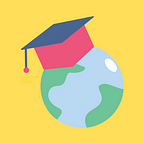Why Students Have a Disconnect Between the Present and Future
“It’s quite fashionable to say that the education system is broken. It’s not broken. It’s wonderfully constructed. It’s just that we don’t need it anymore. It’s outdated.” — Sugata Mitra
Psst…look around. The world isn’t what it used to be, not even close to it. Now, look around your classroom.
What are your goals as an educator? What goals are we taught to have as educators? Let’s reflect on that for a moment. We need to ask ourselves this: do these goals reflect what changes and advancements we need for today and tomorrow?
Look at your textbooks, your material, your lessons and their goals. What has changed since the past? Yes, some things have changed alongside the massive technological advancements in our world, but has enough changed?
Why aren’t more school systems and education boards challenging the idea that endless memorization in school is the key to a successful life and career? Why are we still teaching subjects in a similar way that we did decades ago?
Updating versions of textbooks doesn’t help. There needs to be a gigantic shift in the way we approach education. How can we build strong and independent leaders of the future world with the type of education we have now? Yikes.
“Our rapidly moving, information-based society badly needs people who know how to find facts rather than memorize them, and who know how to cope with change in creative ways. You don’t learn those things in school.” — Wendy Priesnitz
Let me tell you why memorization is not a successful way to teach our children:
- Students lose focus easily when they are trying to memorize things. It’s so incredibly repetitive!
- Students are not meaningfully engaging with the material.
- Students cannot reach their full academic and personal potential.
Most Importantly:
4. Students have more of a disconnect between the past, present, and future.
You see, memorization is like a frontage road. It runs parallel to all the best parts of learning, but it never intersects. It’s like answering questions without understanding the material. It’s like gaining knowledge without learning what it’s all about.
Memorization is taking a detour from all the action of what learning really is all about. It is an ineffective tool for teaching our future generations whom we rely on to be able to quickly think, act, and analyze independently to be creative and advance in society.
Are they gaining the correct set of knowledge and skills to be able to do that?
Learning should be a process of thoughtful exploration and logical discovery mixed together with practical life skills with the world’s future goals in mind. We should not compromise on that.
Conceptual understanding of the topics that are relevant to today’s society as well as the future is the only way for the students to be able to grow a proper perspective when it comes to the future of innovation.
“Education is the passport to the future, for tomorrow belongs to those who prepare for it today.” — Malcolm X
I recently heard from another teacher at my school that if you don’t know coding in 10 years, you’ll be out of work. Gulp.
Hearing that terrified me, thinking of myself as an educator and teacher who wants my students to have a successful life.
The future leaders of the world should be focusing on learning about technology, AI, economics and business, coding, management science, and other real-life practical skills. Recently, I have seen more of these textbooks and more recognition there, but more education systems need to turn their direction this way.
An example of a textbook that I’m talking about is Fundamentals of AI, written by a researcher at Harvard. It’s:
- Very practical.
- Teaches kids about the PRESENT and FUTURE.
- Takes on both coding and non-coding approaches.
Yes, this would also mean that teachers would have to be trained in different ways and teachers’ colleges need to change their curriculums as well. Teachers need to gain a new set of skills to be able to teach differently as well.
If those educators that create curriculums actually had discussions with students, they’d realize that a lot of students are obsessed with innovation, coding, and cutting-edge technology, or have Elon Musk as their role model. One of my second grade students is learning how to code, but nobody else realizes what it is. These are also the types of conversations I have with my middle-schoolers on a day-to-day basis. It’s too bad that our textbooks or general goals don’t reflect that, so our discussion regarding those topics has to be minimum, even if it’s more beneficial and interesting.
This is only because there are so many curriculum builders and educators that are stuck in the past with traditional methods of teaching and traditional ideas of what knowledge is important.
We have to teach children how to think, not what to think.
Chin up! It’s time for some real change in our education system. It’s time to bridge that gap that has existed for too long and shift the focus towards the vision that already exists but needs to be brought more into the light. It’s time to equip the students with proper tools so that they can successfully soar like birds into the future and ultimately, make quicker advancements for the betterment of themselves and the world.
“We have lots of studies about what’s wrong with our education system. We need to accept responsibility, be bold, find solutions, and move forward to make education a centerpiece of our economic development.” — Christine Gregoire
